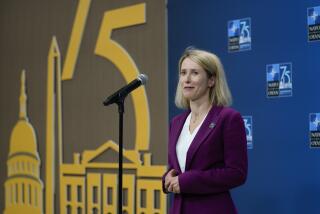Professor at UC Irvine Vying to Lead Estonia : Baltics: Rein Taagepera is one of four candidates in presidential race. The voting takes place Sunday.
- Share via
MOSCOW — After tracking mudslinging U.S. political campaigns for more than 30 years, Estonian presidential candidate Rein Taagepera thought he was well within the bounds of good taste when he chided an opponent for tardiness.
But the California resident’s joking comment triggered a barrage of criticism: The Estonian press and public accused him of “negative campaigning.”
Taagepera had to remind himself again that insights he gained analyzing politics at the University of California, Irvine, do not necessarily hold up on the cobblestoned streets of Estonia’s capital, Tallinn.
A UC Irvine professor of political and social science since 1970, Taagepera, 59, hopes that Sunday’s elections will make him president of Estonia, a small Baltic nation of 1.5 million that regained its independence from the Soviet Union just 13 months ago.
Endorsed by the Popular Front, a leading force in Estonia’s successful drive to break away from Moscow, Taagepera is running third in a field of four, with 18% support, according to a local opinion poll.
Ahead of him are Arnold F. Ruutel, the incumbent head of state and former first secretary of the Estonian Communist Party, and Lennart Meri, a former foreign minister.
Campaigning as the ultimate outsider--his family fled Estonia in 1944, four years after the Red Army occupied it along with neighboring Lithuania and Latvia--Taagepera emphasizes his American background in every stump speech.
He won election to Estonia’s Citizens’ Assembly in March, 1991, while still living in Irvine. His wife, Mare, is a chemistry professor at Irvine; they have one daughter, who was flying from California to be with her father on election day.
“I have lived under democratic institutions for so long they’re a part of me,” Taagepera said, rehashing his campaign’s theme in a telephone interview from Tallinn. “In times of stress, other people with more sordid backgrounds might not find democratic solutions to pressing problems.”
Such rhetoric has boosted his support among voters by 15 percentage points since shortly after he announced his candidacy in August, after returning to Estonia to take a semester-long teaching job at the University of Tartu.
But many citizens are uncertain about the candidate from faraway America and worry that Taagepera has lost touch with the land he left 48 years ago.
Once the most prosperous of the 15 Soviet republics, Estonia has slipped to a state of near-crisis since regaining independence. Behind impressive facades of Gothic arches and medieval spires, thousands of apartments in Tallinn were chilly last winter after Russia cut off shipments of heating oil.
The fuel shortage also forced the government to turn off the hot water in most apartments and eliminate some bus routes. Even the “eternal flame” marking the Tomb of the Unknown Soldier in Tallinn was extinguished to save fuel.
For much of last winter, bread, cheese and butter were rationed. Only children younger than four were entitled to receive milk.
And officials say that this winter could be worse.
Furthermore, tense relations between Estonians and ethnic Russians, who make up 30% of the population, threaten to explode into a Balkans-type civil war, some government officials assert.
A recently approved citizenship law partly disfranchises about 500,000 Russians who moved to Estonia or were resettled here after the 1939 German-Soviet nonaggression pact awarded the Baltic states to Moscow.
Now, Russians can vote in nationwide elections only after passing an Estonian language test and applying for citizenship.
With dire predictions accumulating, some voters fret that a recently repatriated emigre--the University of Toronto-educated Taagepera still holds a Canadian passport--may not be the best person to lead Estonia through another cold, hungry, uneasy winter.
And they worry that the professor, whose speeches sometimes sound like lectures, understands his country in theory but not in fact.
Taagepera’s opponents play on such fears by calling attention to the English words that occasionally slip into his speeches and by criticizing him when he breaks unwritten rules of Estonian politics by daring to challenge his foes’ points during a debate.
“Even his slight American accent when he speaks Estonian might turn off some voters,” Tarmu Tammerk, editor of the Baltic Independent newspaper, said.
But Estonia has already reached beyond its borders once to tap an emigre for a top government post. In April, Swedish citizen Jaan Manitski accepted the post of foreign minister.
Under Estonia’s new constitution (which Taagepera helped draft, faxing suggestions to Tallinn from his office in Irvine), the office of the presidency, which replaces the parliamentary chairmanship Ruutel now holds, will be half-ceremonial, half-substantive.
Elected for a five-year term, the president will nominate the prime minister, Cabinet members and Supreme Court justices, but the 101-member Parliament must approve his choices and can override his vetoes by a simple majority.
In typically dogged, passionless fashion, Estonians seem to favor Ruutel, despite his past as a Communist apparatchik. Although he worked for Moscow, “Ruutel is viewed as someone who tried to undermine the Soviet system in a quiet way from inside,” Tammerk said.
In contrast, Taagepera’s supporters want their candidate elected so he can get rid of the remnants of the complacent, Soviet-built bureaucracy.
“Many people think it’s better to elect someone who was living with us during the whole period of occupation by Soviet forces,” said Hardo Aasmee, former Tallinn mayor and a member of the Popular Front. “But the president’s role is mainly to balance the government and the Parliament. And for that, it’s more important to know about democracy than about life in the Soviet period.”
Victory on Sunday would force Taagepera to make a career choice. His sabbatical from Irvine expires in January, when he is expected back on campus. But the university seems ready to lend him to Estonia, if that’s what voters want.
“He has been one of the statelier figures here and is a distinguished political scientist,” said Russ Dalton, chair of the department of politics and society at UC Irvine. “We would only give him to Estonia if they made him president.”
David A. Avila in The Times’ Orange County bureau contributed to this story.
More to Read
Sign up for Essential California
The most important California stories and recommendations in your inbox every morning.
You may occasionally receive promotional content from the Los Angeles Times.













